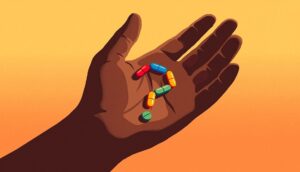Table of Contents
- Introduction to AI in Drug Discovery
- The Role of AI in Identifying Drug Targets
- Data-Driven Drug Design
- Streamlining the Drug Screening Process
- Reducing Drug Development Costs
- Enhancing Precision Medicine
- Real-World Applications
- Future Prospects of AI in Drug Discovery
- Conclusion
Introduction to AI in Drug Discovery
Artificial Intelligence (AI) is transforming numerous industries, and drug discovery is no exception. By leveraging sophisticated algorithms and vast datasets, AI drug discovery enables scientists to identify potential drug candidates more rapidly and accurately than ever before. This technological progress could significantly impact global health by hastening the development of effective and innovative treatments. Implementing AI enables the real-time synthesis and analysis of intricate data, offering unprecedented insights and creating new opportunities for medical research and development advancements.
The Role of AI in Identifying Drug Targets
Identifying appropriate biological targets is a critical step in drug discovery. AI systems can analyze extensive biomedical data to pinpoint proteins, genes, or pathways that could be potential therapeutic targets. These AI algorithms utilize machine learning techniques to detect patterns that would be challenging for human researchers to identify manually. With AI, researchers can sift through millions of data points to find promising leads much faster, which previously would have been a daunting and time-consuming task. This accelerates the initial stages of drug development and increases the chances of success in later clinical trials by focusing on the most promising it gets. Additionally, AI’s ability to integrate various data types, including genomic, proteomic, and clinical data, facilitates a more comprehensive understanding of disease mechanisms.
Data-Driven Drug Design
AI excels in data-driven approaches, making it an invaluable tool in drug design. AI can predict how drug molecules interact with targets through machine learning models, optimizing their efficacy and minimizing potential side effects. The ability to model these interactions computationally saves considerable time and resources compared to traditional experimental methods. For example, according to a study, AI-driven drug design has already shown promising results in developing novel cancer therapies, showing the potential for significant breakthroughs in treating complex diseases. These models can continuously learn and adapt, becoming more accurate over time and providing an evolving toolkit for pharmaceutical research. Moreover, A can assist in identifying drug repurposing opportunities, where existing drugs can be applied to new therapeutic areas, further expanding the r utility and cost-effectiveness.
Streamlining the Drug Screening Process
Traditional drug screening involves testing thousands of compounds in the lab, which is costly and time-intensive. AI can streamline this process by virtually screening large compound libraries. Researchers can quickly identify the most promising candidates for further testing, saving valuable resources and accelerating the discovery pipeline.
Identifying appropriate biological targets is a critical step in drug discovery. This predictive capability is a game-changer, making the overall drug development process more efficient and effective. For instance, AI can evaluate the potential for adverse drug reactions early in development, preventing costly failures in later clinical trials and increasing the likelihood of regulatory approval.
Reducing Drug Development Costs
The pharmaceutical industry is notorious for its high R&D costs, but AI might offer a solution. By improving the efficiency of drug discovery processes, AI helps reduce the overall cost of developing new medications. This expense reduction is crucial, especially as we strive for more affordable healthcare solutions. The financial burden of drug development is one of the primary reasons for high drug prices, and by lowering these costs, AI could make life-saving medications more accessible to a broader population. Moreover, the time saved in the development process means that drugs can reach patients faster, addressing urgent medical needs promptly. Additionally, AI can optimize clinical trial design and patient recruitment, significantly contributing to drug development’s overall cost and duration. T optimization can lead to more accurate and timely data collection, ultimately speeding up the process from discovery to market entry.
Enhancing Precision Medicine
Precision medicine seeks to customize treatments for individual patients using their genetic information and other factors. AI is significant in examining patient data to anticipate how individuals respond to treatment. This enhances the effectiveness of treatments while also reducing negative impacts. By utilizing sophisticated data analytics, artificial intelligence can assist healthcare providers in creating custom treatment strategies that are more likely to be effective. This patient-centric approach represents a significant shift from the one-size-fits-all methodology, improving overall patient outcomes and satisfaction. Moreover, AI-driven precision medicine can identify biomarkers that indicate a patient’s susceptibility to certain diseases or their likely response to specific treatment regimes, enabling more proactive and preventative healthcare strategies.
Real-World Applications
AI is already showing real-world success in various projects. For instance, BenevolentAI used its platform to identify an existing drug that could potentially treat COVID-19. Such examples underscore AI’s potential to address urgent medical challenges swiftly and demonstrate how AI can repurpose existing drugs for new indications, significantly shortening the time frame for finding effective treatments. The rapid response enabled by AI tools can be crucial during global health crises, where time is of the essence, and the demand for quick solutions is high. Additionally, AI can help oversee and control public health information during outbreaks, offering essential perspectives for shaping policy choices and healthcare resource distribution.
Future Prospects of AI in Drug Discovery
AI’s progression in drug discovery appears optimistic, thanks to ongoing AI technology developments and growing partnerships between the tech and pharmaceutical sectors. The synergy of AI and human expertise will likely lead to breakthroughs in treating diseases that currently lack effective treatments. As AI becomes more integrated into research and development pipelines, we expect to see a new era of medical innovation that addresses unmet needs and brings hope to patients worldwide. Additionally, ongoing improvements in AI algorithms and computational power will enhance the accuracy and reliability of predictions, fostering greater trust in AI-driven method logies among researchers and regulatory bodies.
Conclusion
In summary, AI is set to revolutionize drug discovery by making the process faster, more accurate, and less costly. AI has vast and varied applications, from target identification to precision medicine. As this technology continues evolving, it holds great promise for developing new therapies to improve global health outcomes. Integrating AI in drug discovery streamlines the research process and opens up new avenues for groundbreaking treatments, ultimately contributing to a healthier and more equitable future for all. Utilizing AI, researchers and healthcare professionals can collaborate to address critical medical issues, paving the way for a more optimistic future for patients globally.

Asad Arshad, a prolific author of over 50+ websites across various niches, is open to collaboration opportunities. 🌐 For guest posts, reach out to him to benefit from his vast expertise and connect with a diverse audience. 📬



